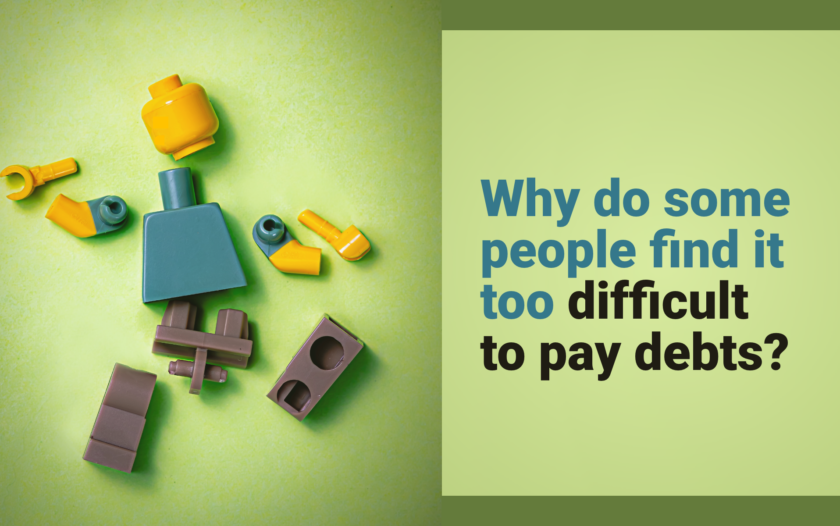Why do some people find it too difficult to pay debts?
About Brooke
Brooke is a freelancer who focuses on the financial wellness and technology sectors. She has a passion for all things wellness and spends her days cooking up healthy recipes, running, and snuggling up with a good book and her fur babies.
Read full bio
At a Glance
Americans are struggling to get out of debt in record numbers. According to major credit bureau Experian’s 2021 State of Credit report, Americans now hold an average of $25,112 in non-mortgage debt with $5,525 of that in credit cards. And it begs the question, “Why is it so hard to get out of debt?”. Here are some reasons you may be struggling to get out of debt and what you can do about it.
It Requires Sacrifice
The vast majority of people who are in debt got there by spending beyond their means. That means the logical first step to course correct for those struggling to get out of debt is to reign in spending. Often, you’ll need to make sacrifices to reduce expenses.
For those who go out to eat frequently, buy whatever they want online, or lavishly spend on gifts for others, the mindset shift to lower spending will be massive. It may also feel uncomfortable at first until you adjust to the new spending limits.
You’re Stuck in a Cycle of Debt
Certain loans, like predatory payday and title loans, can keep consumers trapped in a cycle of debt. Once borrowers miss the first payment, interest and fees accrue so rapidly that it becomes nearly impossible to repay the loan. After that, each missed payment acts as a domino, keeping the cycle going and holding borrowers down. Frequently, it gets to the point where people feel like they cannot get out of debt, no matter what they do!
That’s why, before signing off on any loan, it’s essential to have a solid budget and debt management plan in place. Knowing how much you can afford to pay each month means you can make smarter decisions about taking on debt initially. Avoiding getting into the vicious cycle of debt in the first place is key to financial stability.
Managing Multiple Debts is Complicated
The process of managing payments on multiple debts can be incredibly overwhelming and stressful. And it can lead to missed payments which can damage your credit score even further than simply being in debt in the first place.
The most straightforward option to streamline payments is to consider using a debt consolidation loan. If the vast majority of what you owe is credit card debt, a balance transfer credit card is a comparable option that can help to lower your interest rate and make payments simpler. While there are pros and cons to debt consolidation, sometimes simply calculating how much you can save with debt consolidation is enough to help you decide if this approach is right.
You’re Not Following a Plan
There are tons of debt reduction strategies out there that range from creating a budget to increasing your income. If you haven’t committed to a specific debt-reduction strategy yet, you’re missing out on the fastest way to pay off debt.
In addition to debt consolidation, the most popular debt reduction strategies are the debt snowball and debt avalanche. The debt snowball focuses on starting to aggressively pay down the loan with the smallest amount due first. By getting a quick win, you may feel greater motivation to continue.
The debt avalanche fixates on the highest interest debt first, thereby maximizing your savings on interest over time. With both of these approaches, you’ll continue to make minimum monthly payments on all other debts while throwing any excess funds at the specified loans.
For those curious about debt repayment options, using a loan payoff calculator can give insight into how much you can save with each strategy.
The Bottom Line
Deciding the right approach for how to pay off debt, and then actually sticking to it can be difficult. It’s no wonder that so many people are struggling to get out of debt. However, by making small sacrifices, avoiding getting trapped in a cycle of debt, streamlining debt payments, and following a debt repayment plan, you’ll be well on your way to debt freedom.
FAQs
How do I get out of debt with no money?
When you have no money to put toward debt payments, the two main options you have are decreasing expenses or increasing income. First, establish a spending plan that will keep you within your means. Then, look at options like getting a part-time job or starting a side hustle to bring in extra cash. Be sure any excess money gets funneled directly toward debt and goes to the principal, not interest.
How can I get out of debt forever?
The only way to get out of debt forever is to avoid taking on debt in the first place. But keep in mind that not all debt is considered “bad debt.” For example, a low-interest loan on a home is viewed more as an investment, and the vast majority of people will carry mortgage debt at some point during their lives.
Avoiding high-interest consumer debt means you’ll need to make some big financial changes. For example, you may choose to pay in cash instead of using credit cards and save for vacations, home renovations, or new cars ahead of time instead of taking out loans. It also means you’ll need to have a hefty emergency fund in place, so you won’t need to go into debt to pay for an unanticipated expense.









